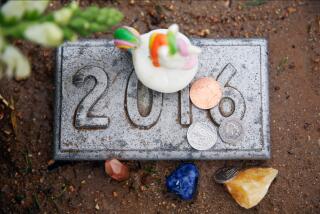Study Finds Many Live, Die for Birthdays : Medicine: Women hang in there, while men tend to throw in the towel before that personal anniversary, a UCSD researcher finds.
What’s in a birthday? Plenty, possibly.
Women are slightly more likely to die one week after a birthday than any other week of the year, and men are more likely to die two or three weeks before their birthday, a San Diego researcher reports today in a medical journal.
After studying 2.7 million deaths of Californians due to natural causes, UC San Diego sociology professor David P. Phillips concluded that birthdays, as well as significant holidays, can affect when a person dies.
“The birthday seems to function as a kind of lifeline for women; but for men, it seems to function as a kind of death line,” Phillips said.
The possible life-and-death impact of a person’s birthday is one factor that doctors and care-givers should keep in mind, he said. The findings, for instance, could influence when a surgeon schedules a patient’s elective surgery.
“This provides systematic statistical evidence for something which was anecdotally reported and often suspected--that the state of one’s psychological health has an apparent impact on the state of one’s biological health,” Phillips said. “In fact, it’s sufficiently strong as to affect the timing of death.”
For the study, published in this month’s issue of Psychosomatic Medicine, the Journal of the American Psychosomatic Society, Phillips looked at computerized death certificates and omitted those who died because they underwent surgery that might have caused their death. He also eliminated people whose birthdays were near holidays, as well as those whose birthday falls on Feb. 29, in a leap year.
Among women, there were 3% more deaths in the week after a birthday than would be expected in a normal week. There were also about 3% fewer deaths than would be expected in the 20 weeks before the birthday.
With black women, the impact of a birthday was even more dramatic. For black women, 11% more deaths than expected occurred the week after the birthday.
“Women are most likely to die in the week following their birthday than any other week in the year,” Phillips said. “They are hanging on to reach their birthday. . . . This suggests that people are moving their death dates from before the birthday to just after.”
By contrast, men seem to regard their birthday with much more ill feeling and trepidation. According to the study, men were slightly more likely to die two to three weeks before their birthday.
Why would women try to survive their birthday while men throw in the towel before it?
The answer rests with traditional gender roles, according to Phillip. In the weeks and days before a birthday, people tend to take stock in their lives, weigh their accomplishments and failures, measure where they are in their lives against where they had hoped they would be.
The group in the study mostly ranged in age from 60 to 80. Though more and more women have entered the work force, they are not among this age group.
“Traditionally, males have been more likely to peg their self-esteem to achievements in the workplace and the goals fostered in the workplace are not always reachable,” Phillips said. “Everyone is supposed to become the chairman of the board, but not everyone can do it, so that’s a recipe for feeling bad.”
Women, on the other hand, may view relationships with friends and family as more important. And birthdays are often celebrations that draw those people together--giving more reason to survive the personal milestone.
In previous studies, published in medical journals Lancet and JAMA, Phillips found that Jewish deaths dipped 31% before the holiday of Passover and peaked by the same amount just afterward. Among Chinese-Americans, similar results were seen with their Harvest Moon festival.
“We wanted to look at birthdays to see if the same peak effect would show up not just for specialized populations like the Jews or Chinese and not just for Jewish or Chinese holidays,” Phillips said.
So Phillips chose a more universal special day: birthdays. “Everyone cares about birthdays,” he said.
In the study, Phillips--who collaborated with UCSD medical student Camilla Van Vorhees and Todd Ruth, a UCSD undergraduate--did not explain how race affected the timing of one’s death.
Phillips does believe that the impact of birthdays can be felt despite race, age and type of natural death, though the rate of that impact may vary.
“We did show that the effect holds for the young as well as the old, it holds for whites as well as blacks, and it holds for a wide range of natural causes,” he said.
Phillips maintained that his research opens the door to more such studies. Others agree.
“What is interesting from a biological point of view is, Where is that switch, in the brain or wherever it is, that helps a person will himself to survive or decide to give up and die?” Albert Marston, professor emeritus in psychology and psychiatry at the University of San Diego, said in an interview with the Associated Press.






